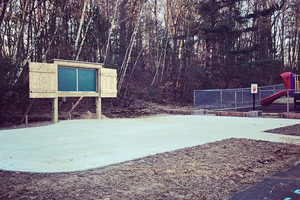- Apply
- Visit
- Request Info
- Give
‘Sustainable CT’ Matches $57K for Community Projects Across State
Written by Michael Rouleau
Published on January 23, 2020


Organizations in seven Connecticut municipalities recently received $57,550 from the Sustainable CT Community Match Fund to kickstart local projects in their communities. The sustainability-minded and community-driven projects include: expanding a youth development program in New Haven; tree plantings across Willimantic; a wayfinding system in Thompson; outdoor classrooms at Bristol schools; new trees in a West Hartford park; community gardens in New London; and a new composting program for Greenwich schools.
The Sustainable CT Community Match Fund doubled the funding available for each project with a dollar-for-dollar match. Sustainable CT is an initiative of the Institute for Sustainable Energy at Eastern Connecticut State University meant to assist communities in becoming more resilient and sustainable. It is funded by the Hampshire Foundation, Emily Hall Tremaine Foundation and Connecticut Green Bank.
$35,000 for Youth Program in New Haven
The New Haven-based organization Solar Youth raised $17,500 ($35,000 including the Sustainable CT match) from a crowdfunding campaign to grow its 2020 green jobs-development program in the city’s West Rock neighborhood. Solar Youth staff will now work to recruit participants and finalize partnerships for the internship program, which helps local teens build job-readiness skills and learn about careers in the green sector.
$26,000 for Native Plantings in Willimantic
325 Trees & Shrubs, a Windham-based neighborhood group, raised $13,000 ($26,000 including the Sustainable CT match) to plant native tree and bush species in public spaces across Willimantic. The crowdfunding campaign was supported by 60 donations, ranging from $10 to $3,000. Project leaders are now consulting with Windham Public Works and a local tree company to choose public sites in the city in need of re-greening—public parks, ball fields and roadsides—and choosing plant species appropriate for each area. Planting is slated to begin in September and October.
$20,000 for Wayfinding Project in Thompson
The Thompson Planning and Development office raised $10,436 ($20,872 including the Sustainable CT match) for its “Traveling Through Thompson” wayfinding project, which will help residents and visitors find their way around town. The crowdfunding campaign was supported by 43 individual donations. The town will now initiate agreements for the design program and workshop, which is expected to be completed this coming fall.
$14,900 for Outdoor Classrooms in Bristol
Bristol’s Public Works Department and Board of Education has full funding to build outdoor classrooms in all Bristol public schools. The city raised $7,475 from a crowdfunding campaign supported by 50 individual donations—the Sustainable CT match brings total funding to $14,950. The project is now in the planning phase; classrooms are expected to be completed by May 2020.
$10,000 for New Trees in West Hartford
Friends of Fernridge Park, a neighborhood nonprofit organization in West Hartford, raised $5,000 ($10,000 including the Sustainable CT match) to plant trees along Fernridge Park’s new promenade. Support for the crowdfunding campaign came from residents and businesses, notably a generous donation from Trout Brook Landscaping. Friends of Fern, in partnership with West Hartford’s Leisure Services Department, expects to plant several varieties of native trees this spring, in time for the promenade’s dedication—currently scheduled for June 13—and more when the promenade’s second phase is completed.
$6,000 for Community Gardens in New London
The Eastern Connecticut Community Gardens Association (ECCGA) raised $3,010 ($6,020 including the Sustainable CT match) to install gardens for FRESH New London, Riverside Community Garden and New London High School. The gardens are expected to be completed by April.
$3,200 for Composting in Greenwich Schools
The Town of Greenwich raised $1,623 ($3,246 including the Sustainable CT match) for a composting program to be implemented at two public elementary schools. The marine division of the town’s parks and recreation department will soon construct composting bins and have the project installed and finalized by Earth Day, April 22.
About Sustainable CT and Community Match Fund
These projects were supported by the Sustainable CT Community Match Fund, an innovative funding resource that provides a dollar-for-dollar match to all donations raised from the community, doubling local investment. This program is helping to bring projects across the state to life by providing fast, accessible funding as well as fundraising coaching and support to residents and organizations with great ideas to make their communities more sustainable.
Anyone in a Sustainable CT-registered municipality (more than 50 percent of the state) is eligible to receive this funding, meaning that schools, nonprofits, community groups and individual residents can all propose projects and access the matching funds. To start a Community Match Fund project, visit ioby.org/sustainablect or contact Sustainable CT’s Abe Hilding-Salorio at hildingsalorioa@easternct.edu or 860-465-0256.
“Through the Community Match Fund, we aim to put residents at the forefront of creating positive, impactful change,” said Hilding-Salorio, community outreach manager for Sustainable CT. “Match Fund projects are community led and community funded, demonstrating the power of people working together to make change in their communities.”
Sustainable CT, an initiative by the Institute for Sustainable Energy at Eastern Connecticut State University, provides a roadmap of sustainability best practices for towns, technical assistance, funding and recognition through certification. Forty-seven towns and cities across Connecticut have earned the prestigious Sustainable CT certification, demonstrating accomplishments in nine impact categories including inclusive and equitable communities, cleaner transportation, vibrant arts and culture, natural resource stewardship and affordable housing. Find more information at www.sustainablect.org.


